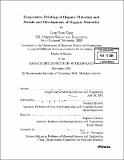Evaporative printing of organic materials and metals and development of organic memories
Author(s)
Kang, Sung Hoon, 1974-
DownloadFull printable version (5.910Mb)
Other Contributors
Massachusetts Institute of Technology. Dept. of Materials Science and Engineering.
Advisor
Vladimir Bulović and Francesco Stellacci.
Terms of use
Metadata
Show full item recordAbstract
The advantages of directed printing make it the ideal fabrication tool for the ubiquitous electronic technologies of the future. However, direct printing techniques such as ink-jet technology, are currently limited to materials that can be processed in solution. We developed a novel micro-machined print head capable of expanding the capabilities of inkjet printing to metals and molecules that are suited for evaporative deposition. Deposition of metals is particularly desirable advantage of the proposed printer. We demonstrate arbitrary organic and metal patterns by printing, with the line width modulated by controlling the micro-machined shutter. With the challenges and solutions for ambient pressure printing are also studied. Additionally, the printer can be used for organic crystal formation, and controlled doping. In the second part of the thesis we examine charge trapping and storage in organic thin film devices. We demonstrate that by controlled doping, we can engineer charge storage in active organic electronic devices. Charge trapping in organic hetero-junction structures results in two distinct phenomena that both manifest as a memory behavior. Trapped charge can (1) increase the carrier mobility in organic structures, (2) generate current during the de-trapping process. Both processes are demonstrated in practical structures.
Description
Thesis (S.M.)--Massachusetts Institute of Technology, Dept. of Materials Science and Engineering, 2004. Includes bibliographical references (p. 125-132).
Date issued
2004Department
Massachusetts Institute of Technology. Department of Materials Science and EngineeringPublisher
Massachusetts Institute of Technology
Keywords
Materials Science and Engineering.